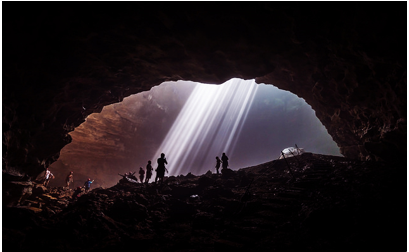LIVING IN JOGJA
About Indonesia – Heaven on Earth
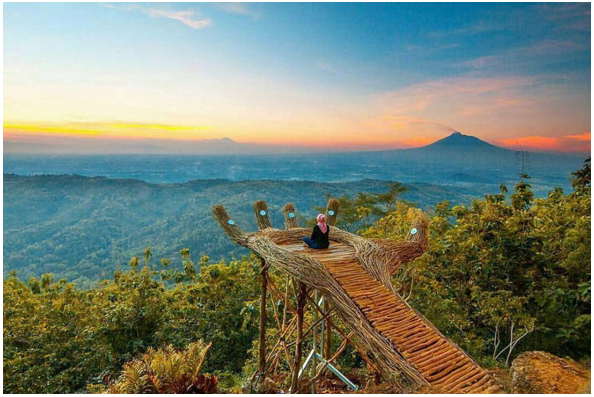
(Picture 1. Pinus Pengger, Dlingo)
In the presence of visitors, Indonesia is regarded as the Heaven on Earth. This predicate is not without purpose linked to this country -the cuisine, the multicultural society, the regional arts, the abundance of natural resources- make this country recognized as one of the most beautiful countries in the world.
Geographically, Indonesia is located between the continents of Asia and Australia, as well as between the Pacific Ocean and the Indian Ocean. Indonesia is also considered as the largest island in the world with more than 17,500 islands. However, with a population of more than 270 million, Indonesia is also recognized as the fourth most populated nation in the world.
In the field of education, Indonesia continues to improve the system, particularly in institutions. Internationalization is taking the first place for campus development in almost all universities. Thus, Indonesia is very accessible with the participation of international students to study here. With so many things to offer, Indonesia has become a prospective country for you who want to experience rich culture and knowledge.
TIME ZONE
Indonesia is divided into three time zones, namely:
- WIB/Western Indonesia Time (Sumatra, Java, West and Central Kalimantan) is seven hours ahead of GMT.
- WITA/Central Indonesia Time (Bali, South and East Kalimantan, Sulawesi, Nusa Tenggara) is eight hours ahead of GMT
- WIT/Eastern Indonesia Time (Maluku, Irian Jaya) is nine hours ahead of GMT.
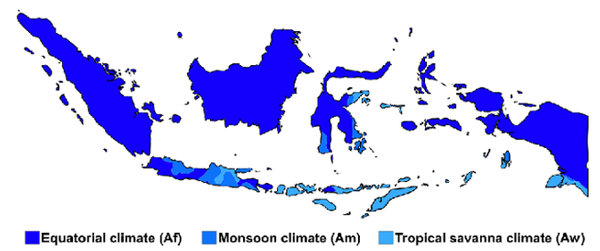
CLIMATE AND SEASON
The climate in Indonesia is divided into three types: monsoon climate, aquatic climate (Af), tropical savannah climate. As a tropical region, Indonesia is divided into two seasons: the dry season from March to September and the rainy season from October to February.
The average temperature in Indonesia is between 25° C at night and early morning and 34° C at noon. In Yogyakarta, January is the month with the most rainfall, while the warmest months are April, September and October with an average high temperature of 31 ° C.
RELIGION
There are 6 officially accepted religions in Indonesia, namely: Islam, Protestantism, Catholicism, Hinduism, Buddhism and Confucianism. Even though, Islam is the dominant religion, religious tolerance continues to be upheld. Religious holidays in these six faiths are observed as national holidays here.
LANGUAGE
Indonesian has more than 700 regional languages from the edge of Sabang to Merauke. The majority of the population uses the local language in daily life. Although the population of Jogja, which is primarily Javanese, students prefer to use the national language in campus life.
CLOTHES
In general, students typically wear smart outfits in the campus area. Since UMY is an Islamic campus, all Muslim women-students, lecturers, staff-are expected to wear hijab during their activities. Men can wear shirts, denim, or flaid shirt paired with jeans, loafer shoes or slip on shoes. Furthermore, miniskirts, shorts, sandals are not permitted to attend classes. In addition, students who are part of certain organizations or communities also wear official clothes on certain events while formal attire will be required during the thesis defense, annual campus events or graduation day.
Living in Yogyakarta- Beauty in Diversity
YOGYAKARTA (also called Yogya or Jogja) is located in the center of the island of Java. Here, it’s a cheap place to live as a student. With just $20 a day, you can stay, eat affordable, authentic, delicious food, and rent a motorbike to explore the white sandy beaches and thousands of years old temples.
What Jogja offers to you?
- Tons of unique story to tell
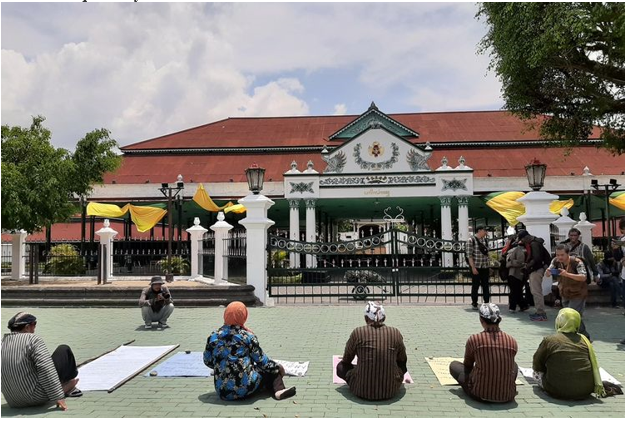
Image of Karaton Ngayogyakarta Hadiningrat (Yogyakarta Palace)
The term of “Jogja Istimewa” is truly special here. Jogja was given the status of special autonomy equal to the province on 15 August 1950. The city is the only province in Indonesia to be allowed to follow the royal system. Therefore, those who rule in Jogja are descended from Sri Sultan Hamengkubuwono I (the Founder of the Yogyakarta Palace) with different legal and political policies compared to others.
- Numerous lovely spots to visit
Jogja has always had an interesting story to tell. Perhaps this is also the reason why people find it hard to forget this city. Undoubtedly, Jogja is one of the most visited cities besides Bali, since this city offers an appealing destination, relaxed and refreshing to visit. At tourist sites, you can encounter high school students who are looking forward to having a conversation in English with you to improve their language skills.

The most active volcanoes on earth: Mount Merapi
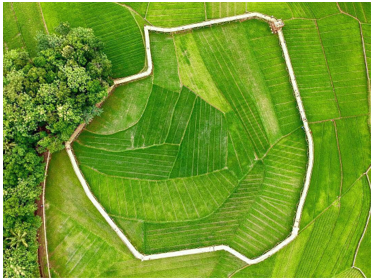
Gambar The hidden beautiful paddy field: Sukarame, Mangunan, Dlingo
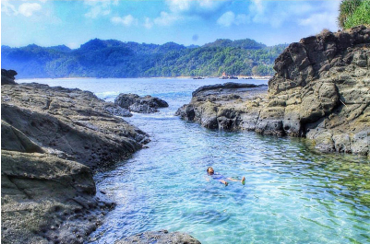
A lovely escape beach: Wedi Ombo, Gunung Kidul
A Light of Heaven: Jomblang Cave, Semanu, Gunung Kidul
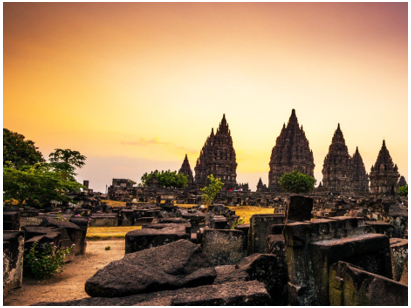
An UNESCO World Heritage Site: Prambanan Temples, Sleman
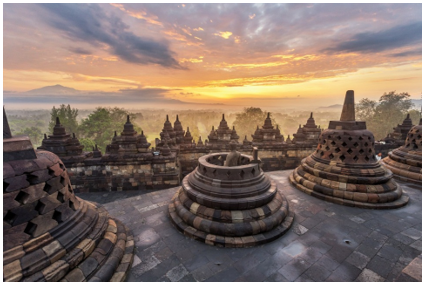
An UNESCO World Heritage Site: Borobudur Temple, Magelang
- Delicious local dishes and beverages to try
If you are a culinary hunter too, the right option is to study in Jogja. You can be able to visit foodie places to nourish your stomach when you are tired after doing homework. This town is the center of traditional gastronomy. You don’t have to spend a lot of money to get a large part of this. Interestingly, you will find plenty of stalls on the roadside where people sat on mats and ate or known as ‘lesehan’, a local dining style in Jogja.


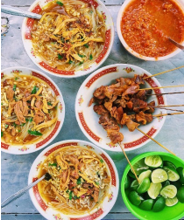
Mie Ayam Bu Tumini Sathay Klathak Pak Pong Soto Ayam Pak Dalbe
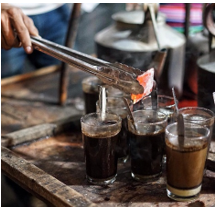

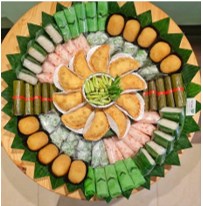
Angkringan Kopi Jos Lek Man Bakpia Kue Tampah
- Fairly affordable to live
As the City of Student, Jogja is the perfect place to explore your academic as well as non-academic skills. In comparison, living in Jogja is more accessible than living in major cities such as Jakarta. So, that’s the reason Indonesian students come here from all over the cities. These are the all-average cost of student life in Jogja, but it also depends on each student’s lifestyle.
- Basic monthly expenses:
- Meals: 65-90 USD
- Internet: 7-15 USD
- Transportation: 7-15 USD
- Textbook or Printing: 4-15 USD
- Toiletries: 7-15 USD
- Recreation: 15-20 USD
- Incidentals: 20-25 USD
Total expenses: 125-195 USD
UMY offers the University Residence (UNIRES) student dormitory for housing, which is open to the university for freshmen, exchange students and UMY Grantees Scholarship. This place is a short walk from the campus. It also provides a pleasant environment for your personal growth, expanding awareness of Islam. Here you can also develop your ability to learn both English and Arabic.
Additionally, students can also opt to live in a boarding house–where you can pick the facilities you want depending on the price you’re willing to pay. Spends approximately USD 27-40 a month.
- Humble and friendly people to be your buddy
What Jogja makes you feel at home is that people here are respectful and welcoming. Making friends and culture is easy for you too. On campus, the buddies can help you adjust to the cultures of campus and Jogja as a regular life.
- Interesting Arts & Culture Events
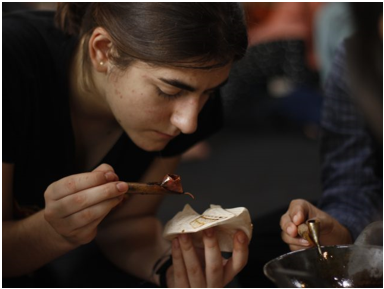
In fact, both in terms of culture and UMY Jogja is very creative. Our campus provides various events to promote the international community around the world including: ICCF (International Cultural and Culinary Festival), Taiwan Higher Education Fair (THEF), Summer School, Short Visit Program, Batik Design Seminar, etc. There you can learn more about the cultural activities that take place every year.
Your journey is begin!
